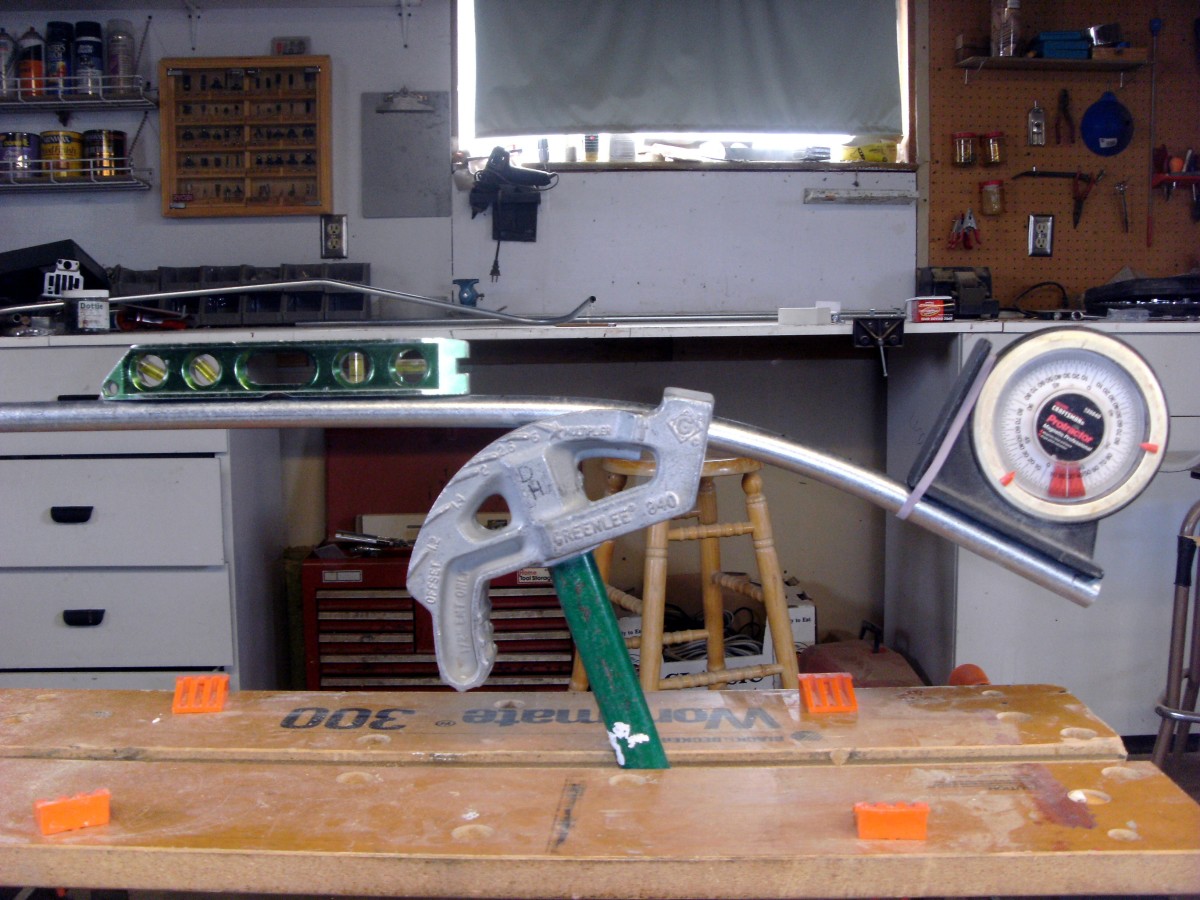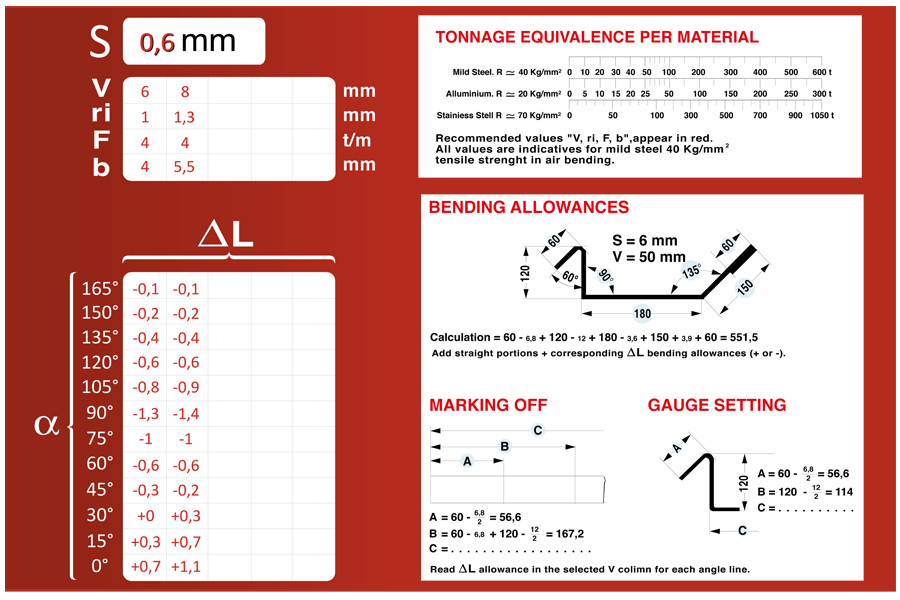
Hastelloy Pipe Bend
2. Measure the desired length of the stub. A stub up bend is a 90º bend near the end of the conduit. Measure the distance on the wall from the end of the conduit to the position of the bend. 3. Subtract the take-up height. The radius of the bend will add extra length to the bent end of your conduit.

Tube Bending Calculations
As an example, to bend 3/4" EMT conduit have a free end height of 8.5", the table indicates to subtract 6" from the 8.5" which leave 2.5" from the end to bend up to make the mark. Tip: Advanced benders can lay a tape measure next to the conduit and perform the bending operations if the bend does not call for high degree of accuracy. 4.

Wood Bending Radius Chart
How to Bend a Box Offset with an EMT Bender. A box offset is a small Z-shaped bend and is commonly used on conduit connecting to an outlet box. Make a mark 2 ½" from the end of the pipe. Make another mark 2" from the first mark. Stand the bender on its handle and insert the EMT conduit into the bender. Align the first mark with the bender's.
Nec Conduit Bend Radius Chart In 2023 What You Need To Know
Simply subtract the take-up, or 6", from the finished stub height. In this case 14" minus 6" = 8". Step 2. Mark the conduit 8" from the end. Step 3. Line up the Arrow on the bender with the mark on the conduit and bend to 90°. Remember: Heavy Foot pressure is critical to keep the EMT in the bender groove and to prevent kinked conduit.

Electrical Conduit Math Math Encounters Blog
Multiply the radius of the bend you want to make by 6.28, then by degrees, bend and divide by 360. Divide once more by two, measure from the center of the pipe that far then set that mark at the front edge of the bending shoe. The center of the bend should be very close to the center of the pipe.

conduit bending chart Google Search Conduit bending, Chart, Map
Hand Benders. Every electrician should have their own set of hand benders, to include at a minimum a bender for ½" EMT, one for ¾" EMT (the ¾" will also bend ½" rigid pipe). If possible, a bender for 1" EMT (will bend ¾" rigid as well) is also recommended even though many shops will provide this.

Greenlee 555 Bending Chart
Most offset bends are made "in the air." This means the bender is used upside down with the handle on the ground and the bending foot in the air. Insert the conduit into the bender with the 38" mark positioned at the arrow normally used to bend a 90. (You can use any mark on the bender as long you use it for both bends.

EMT Electrical Conduit Pipe Bending Instructions for Making Concentric
To use the deduct figure, measure the distance to the far edge of the 90 and subtract the deduct figure. If ½" pipe is being bent and the distance is 56", place a mark on the conduit at 51"; this is where the bender will be placed. Work the bender onto the conduit with the conduit mark at the arrow of the bender.

Conduit Bending Basics 3 Bend Saddle YouTube
Shop Now. Keep in mind, when bending offsets, the conduit will shrink. If bending at 10 degrees, the conduit will shrink 1/16" for every inch of rise. 15 degrees is 1/8" for every inch, 22.5 is 3/16", 30 is 1/4", 45 is 3/8" and 60 is 1/2". Example: For a 4" offset height at 30 degrees, place your first mark at the distance from the obstacle.

Nec Conduit Bend Radius Chart In 2023 What You Need To Know
In today's video Dave gives a beginners guide to bending EMT Conduit. Adding bends to your project is a great way to save money and add unique angles to your.

Emt Conduit Bending Chart
15 mins. One conduit bend. Estimated Cost: $10 to $20 (daily tool rental and conduit) EMT (electrical metallic tubing), sometimes called "thin-wall conduit," is a form of rigid metal conduit used to protect circuit wires where they must run in exposed locations, such as in basements, along the surface of walls, or in outdoor locations.

Electrical Conduit Math Math Encounters Blog
Bending EMT. Use a bender of the correct trade size designed for bending EMT. EMT trade sizes 1/2, 3/4 and 1 can be bent with hand benders because of the thinner wall. Use a mechanical ratchet-type bender for trade sizes 1 1/4 and 1 1/2. Use a power bender for trade sizes 2 and larger.

IDEAL Hand Conduit Benders How to Make an Offset Bend YouTube
Multiply the radius of the bend you want to make by 6.28, then by degrees, bend and divide by 360. Divide once more by two, measure from the center of the pipe that far then set that mark at the front edge of the bending shoe. The center of the bend should be very close to the center of the pipe.

Nec Conduit Fill Table Emt Sharps wiring
Dividing 28.2" by 18 bends, we see that each bend should be 1.57" apart - we'll round that off to 1.5" apart. Now that's about the minimum possible using a ½" conduit bender, but the fact that we will be making only 5º bends helps. Mark the conduit with 18 marks made 1.5" apart.

Bending Chart Tecnostamp srl
For saddles greater than about 3", a 4-point saddle is probably the way to go. Begin by measuring the distance to the obstruction and marking that distance on the conduit. For example, if that measurement is 40", make a mark 40" from the end of the conduit. Measure the height of the obstruction; it is common to add perhaps ½" to this.

How To Bend 1/2 Inch Emt Conduit
Slide the conduit forward until the next mark is on the arrow used to bend a 90° angle and rotate the conduit 180° before bending the second bend to 11°, or a tiny bit over the 10° mark on the bender. Next, reverse the conduit and reinsert into the bender and line up the third mark to the arrow.